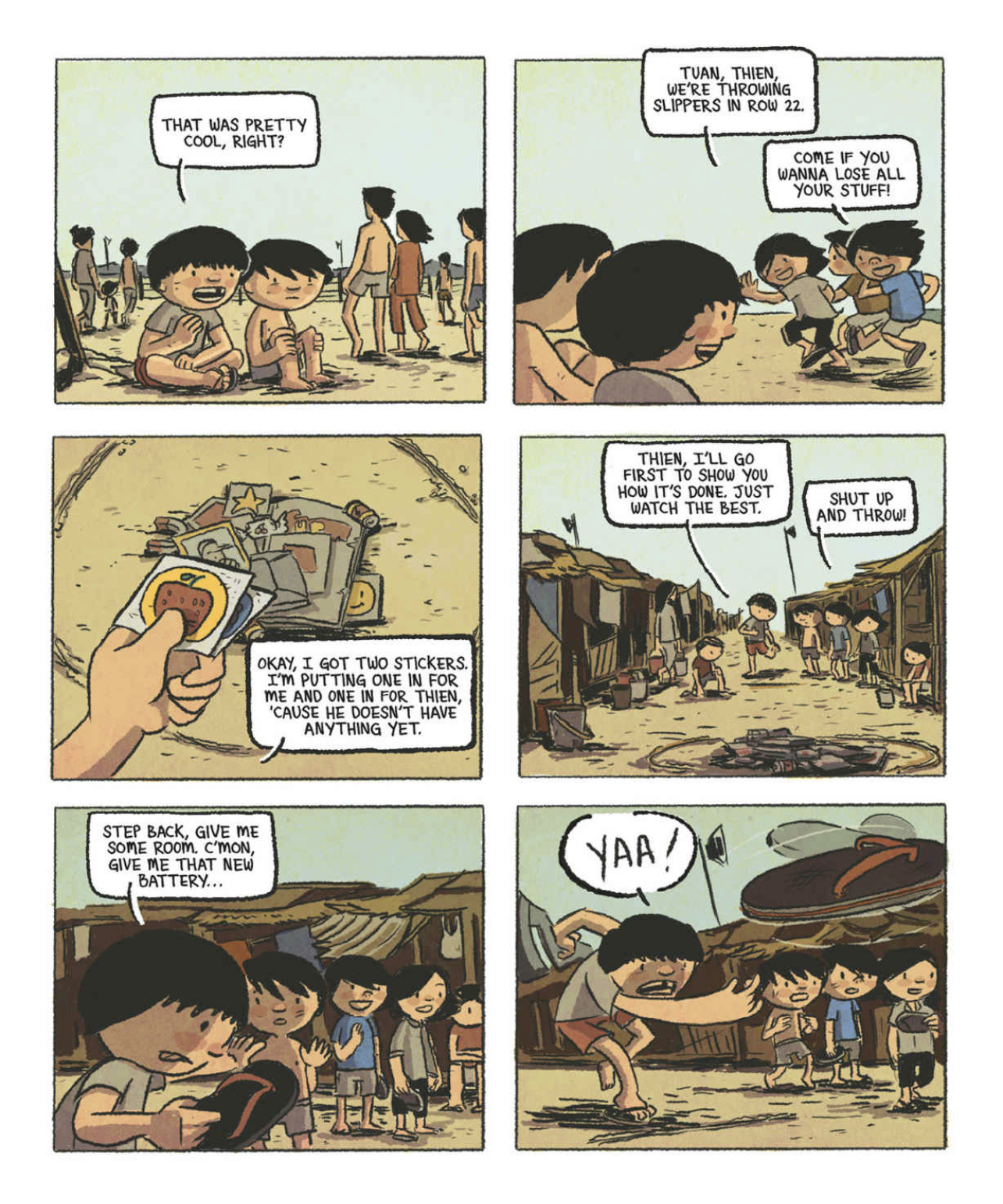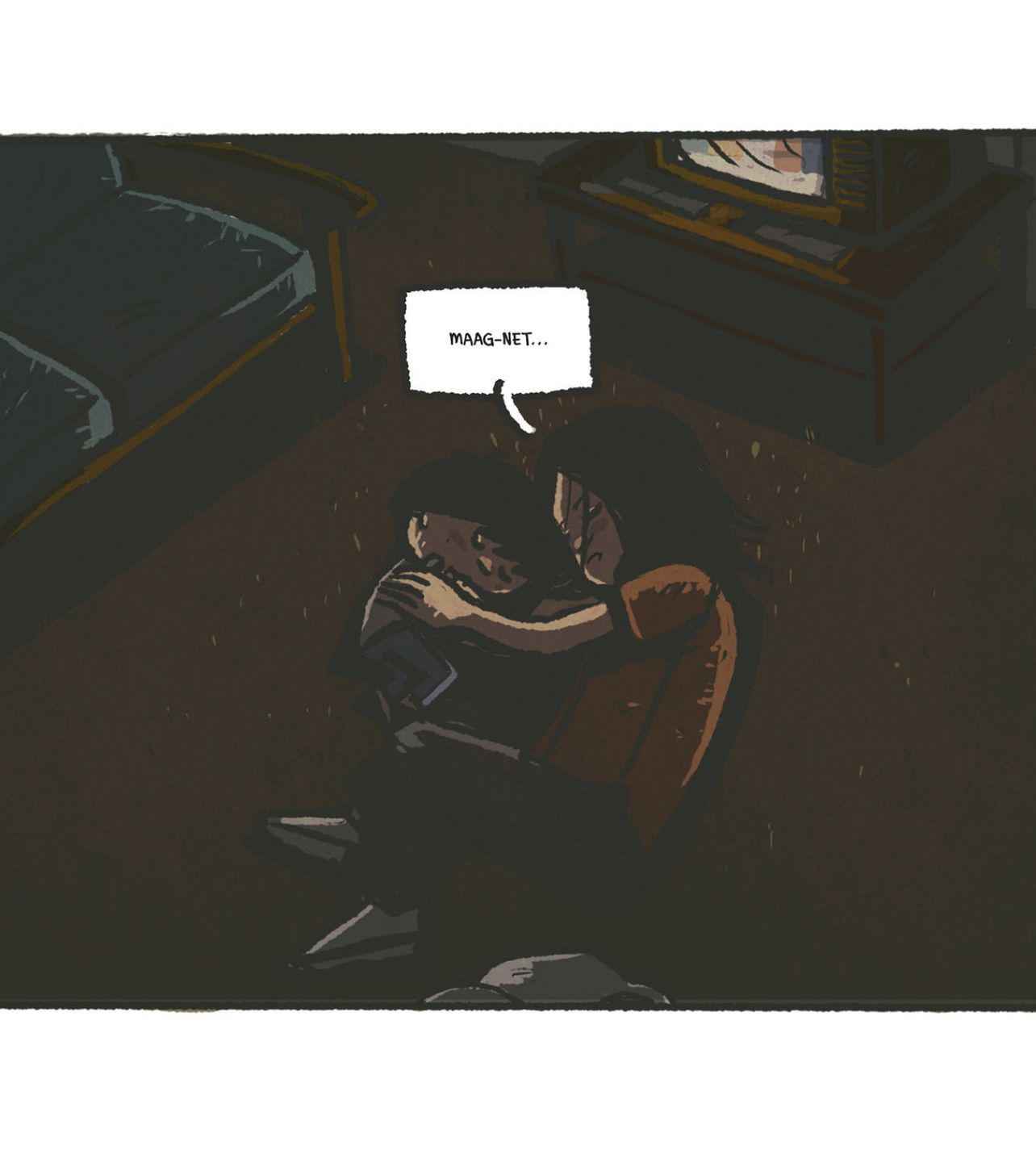
What forces bind us together? Are they biological, cultural, shared experiences? Are they forces tangible or intangible? Good or ill? These are the questions at the heart of Thien Pham’s Family Style, a poignant and disarmingly humorous graphic memoir about Pham’s formative refugee experience. According to the UN Refugee Agency (UNHCR), during 2022, 108.4 million people were “forcibly displaced” around the globe due to “persecution, conflict, violence, [or] human rights violations,” 35.3 million of which were refugees. A whopping 43.3 million of these displaced persons were children, a number that’s doubled in the past decade alone per UNICEF; this is equivalent to about 13% of the population of the United States. In 2022, the US resettled about 25,500 refugees through its Refugee Admissions Program, a rate dramatically lower than its 125,000-spot maximum. It’s difficult to care about one statistic among many, but Family Style takes what might have otherwise remained a faceless number and turns it back a living breathing human being. Cleverly disguised as a food memoir, the book tells a compelling story about the structures—both large and small—that hold society together, and how they can collectively nourish or malnourish us.

The story begins with adult Thien recalling his first memory - the capture of his refugee boat by pirates. This memory is so epic in scale it breaks the narrative’s mostly six-panel grid layout, as a series of large splash pages suggest the magnitude and distress these formative events have on his life. Firmly glued to his mother’s side, Thien’s eyes shut against the pirate invasion overtaking their ramshackle refugee boat. Pages alternate between images of horrifying violence and solid black, mimicking Thien’s fluttering eyes as he both looks on and looks away. Atop the corporeal brutality of these events is the reassuring sound of his mother’s disembodied voice in caption: “It’ll be okay…” “Everything will be okay.” Her mantra is a gamble; everything is not okay, and there’s no guarantee it ever will be. But as this opening scene unfolds through the reader’s shared perspective with young Thien’s furtive observations, the reader is compelled to ask: who notices the violence and pain done to others? Who acts against such injustice, and who offers empty platitudes?

The challenge of storytelling is crafting moments across a narrative that prove more impactful than they first appear. In Pham’s hands, what seem to be innocuous but charming anecdotes create deeper resonances as the story unfolds. For example, the recurring game of ‘throwing slippers’ that Thein plays with fellow child refugee, Tuan, to win small prizes, mirrors the greater gamble Thien’s parents make in leaving Vietnam on a refugee ship. Leaving their home and culture behind, they can only hope for the opportunity to shape a better future for themselves – a life free from terror, turmoil, poverty, and persecution. Like Thien, who has Tuan to stake him in his low-level gamble, Thien’s parents must rely on the kindness of strangers to stake them using whatever tenuous connection they possess: a common place of origin, a similar life experience, a shared culture, democratic idealism. When such intangible connections fail, a physical monetary exchange is the only route to survival. Newly landed at an overpopulated refugee camp in Thailand, the offer of provisional shelter comes at a price. Holding tightly to her children across the perilous sea voyage and throughout the pirate encounter, the earlier intangible value of a family’s bond becomes tangible as a small sum of money sewn into the clothes of Thien’s younger brother is revealed. Pham deftly guides the reader through these interconnected anecdotes, cultivating deeper reflections around shared values and ideologies that ebb and flow, collect and collide, and ultimately shape our society and our daily lives.

The idea of familial, societal, and cross-cultural bonds is amplified across the text through Pham’s repeated use of metaphor involving a magnet. Early in his camp experience, Thien hopes to win a magnet from the ‘throwing slippers’ game. Over the course of the game, however, Thien gains something far more valuable: a friend in Tuan, who later gifts him the magnet, serving as a tangible reminder of their bond when Tuan’s family leaves for the United States. It holds the promise of a later reunion, a world away. The magnet becomes a subtle hallmark throughout the book that Thein plays with as new relationships form or fall apart. When his family also arrives in the US, as he struggles to find the words to connect to his new world, “magnet” becomes one of the first English words Thien learns - a word he shares with his mother. Pham’s repeated image of Thien sticking a steel washer to the magnet elegantly echoes the image of his mother holding onto him, as she has since the opening scene of the book. By magnifying small details and thoughtfully interweaving them throughout the text, Pham not only shapes an incredibly poignant story, but also shows how such small instances build towards much larger resonances.

The narrative of sacrifice, struggle, and tenuous gain Pham tells of his family’s settlement, life, and work in the United States stands in sharp contrast to the growing anti-immigrant political landscape of current American partisan politics. In the face of widespread social fear and hate of ‘outsiders’, it seems implausible that any one individual could affect change. But just as Pham’s narrative underlines the importance of a single story, and the countless similar stories it implies, so too does the democratic ideal suggest the power that the individual has within the collective: the promised but intangible connection between the citizen and the nation. What is a citizen but an individual who works to enrich their community, however big or small? The very notion of citizenship is founded upon action, the responsibility to stand up and be counted, the ability to facilitate betterment through thoughtful participation - a betterment millions of refugees and immigrants have contributed since America’s founding.
Like the magnet of his childhood, Family Style delivers a nuanced and compelling story that forges empathic bonds between the reader and its author's experience, reminding us how connected we are to one another and how vital that connection is to our collective well-being.









